Walking Through Athens: A Cultural Journey Beyond the...
From historic landmarks to edgy street...
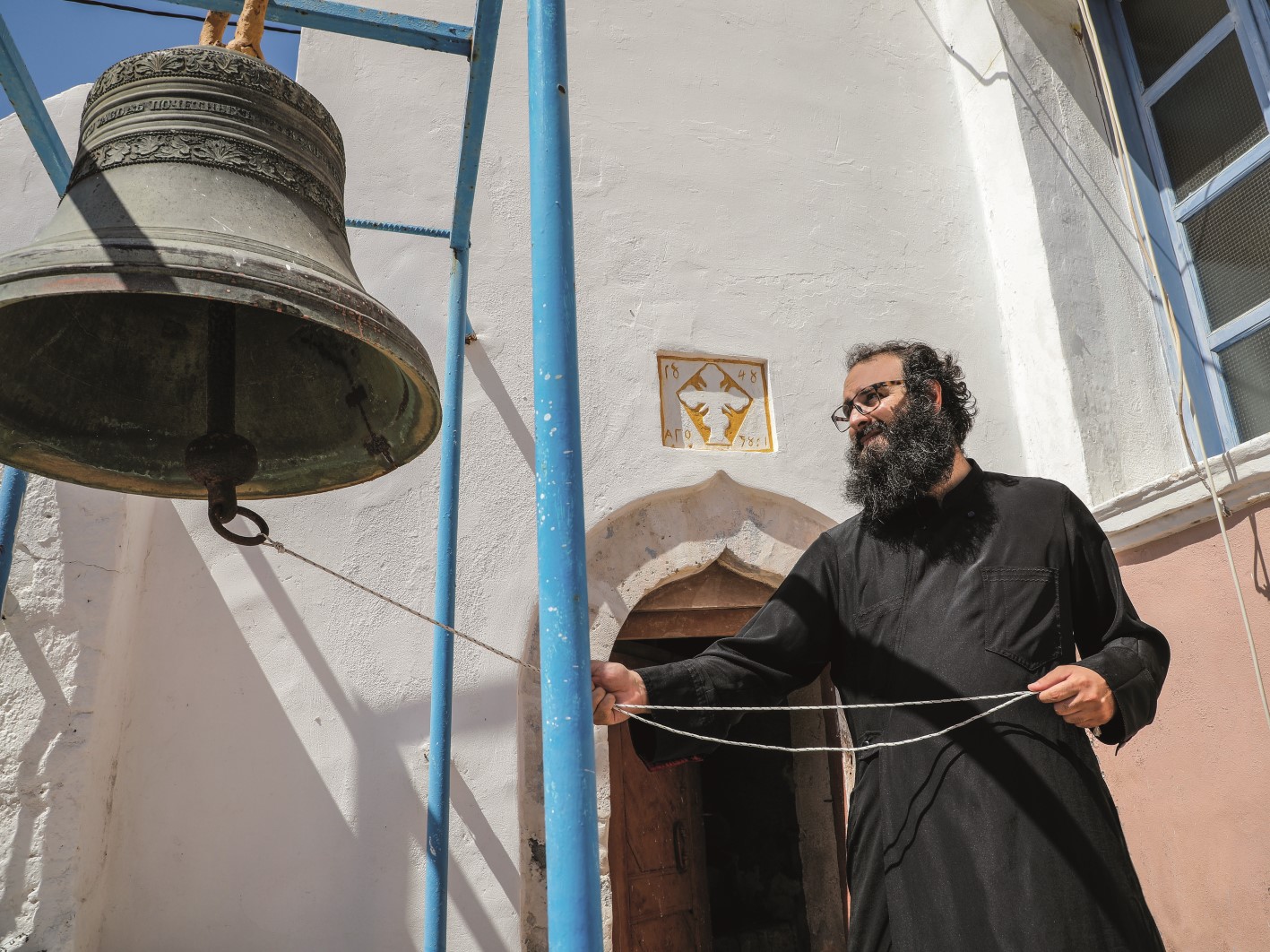
Father Christos Symeonidis is Kastellorizo’s new priest, who moved on the island just a short while ago.
© Nikos Kokkalias
Father Giorgos’ prayers drifted out of the tiny Church of Aghios Panteleimonas, dispersing into the wind like incense, over the faithful gathered in the cool Kastellorizo churchyard, among the trees and prickly pears. His murmurs became one with the quiet chatter of the congregation, the laughter of children and playful banter – every generation present on the eve of the feast day for the all-merciful Saint Panteleimon, healer of souls.
Such religious occasions bring together the few hundred locals who aren’t, however, the only ones on this island – just a few meters away, a group of National Guard soldiers stood by, paying their respects, their berets removed, their necks, faces and arms scorched by the sun.
All of them were Cretans, from villages in Irakleio. Many of the older women blessed themselves instinctively at the sight of the soldiers. One walked up to them: “Thank you, boys, for looking after us,” she said in a tender whisper, pressing communion bread into their hands, the humblest expression of the islanders’ gratitude.
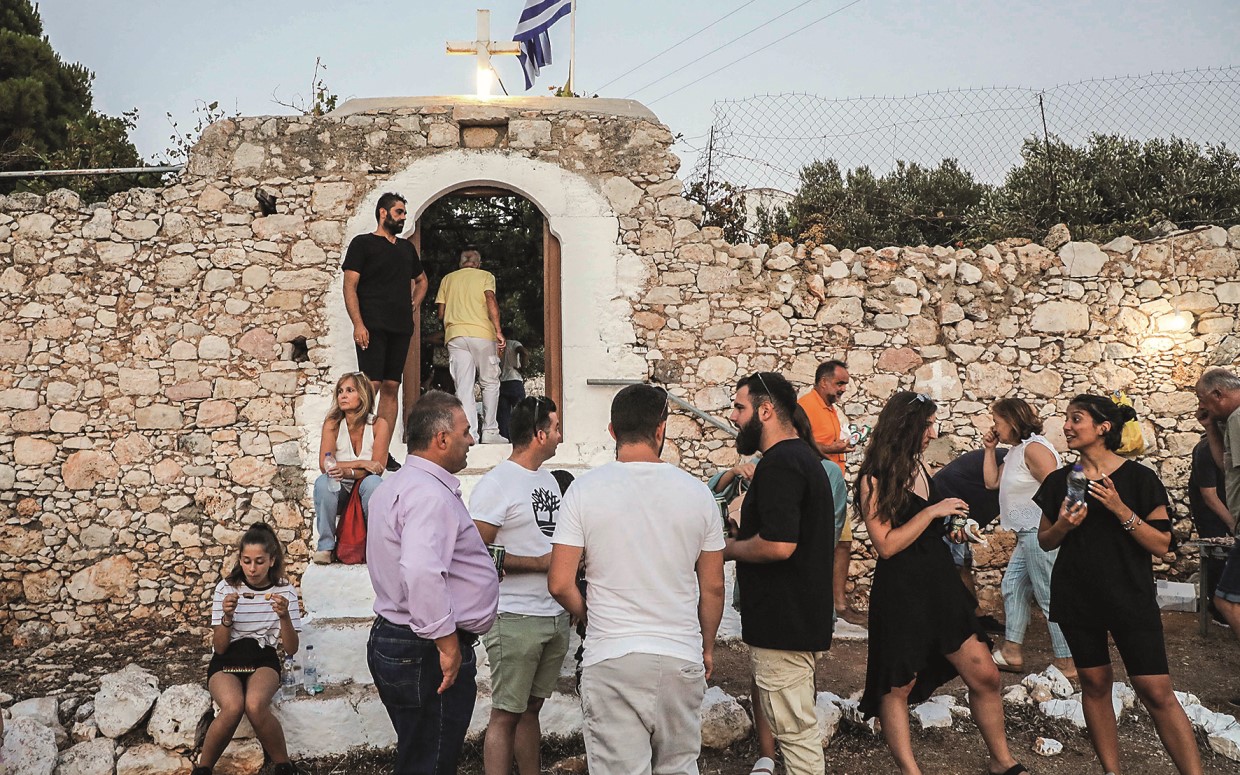
At the festival of Aghios Panteleimonas, at a chapel near the airport.
© Nikos Kokkalias
Outside the fence, the god Dionysus was running the show as rows of pork souvlaki roasted on charcoal grills and dozens of cans of beer chilled in icepacked styrofoam coolers. A cluster of ruins near the church marks the location of the island’s ancient capital, Paliokastro. You can see everything from its crumbling walls. Turkey is so close you can almost reach out and touch it.
The narrow strait is dotted with uninhabited islets, big and small. In tranquil times, only fishermen can say with any precision where the border lies on the untroubled sea. As the sun started to set, the woman beside me made a video call to her cousins in Australia to show them the idyllic scene over her phone: “What a shame you’re in lockdown! I wish you could be here to see how beautiful it is!”
Most of the island’s émigrés could not visit as usual this summer. Flight restrictions imposed because of the pandemic canceled the annual pilgrimage home – more Kastellorizians live in Australia and the US than on their ancestral island.
Kastellorizo is one of Greece’s most enchanting destinations; the first sight of the main town takes your breath away. The port is perfectly geometrical, like an open-ended rectangle, with a row of brightly painted houses – a scene of Lilliputian perfection. Every power that has ever passed through here sought to conquer it, but it never lost its Greek spirit.
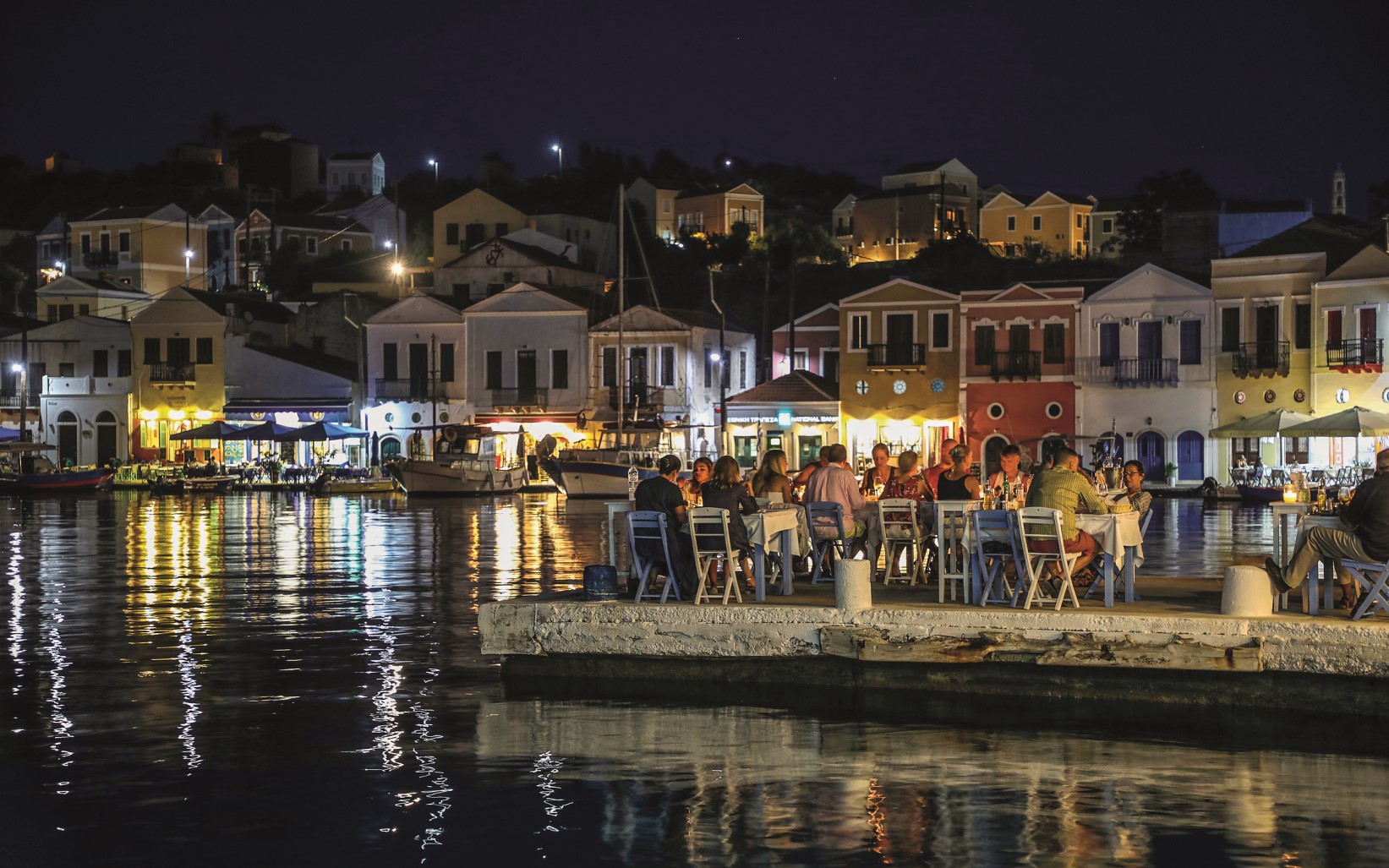
Harborside tables add to the charm of an evening meal out.
© Nikos Kokkalias
With 250 permanent residents and a constant military presence, it is a tiny island community of enormous geostrategic importance for the country. Thanks to Kastellorizo, Greece has the right to a continental shelf – and exclusive economic zone (EEZ) – that would meet that of Cyprus, limiting the reach of Turkey, which persistently challenges the provisions of international law.
The “outpost” of Kastellorizo found itself at the center of international attention during this summer’s spike in tensions between Greece and Turkey, which also resulted in mock dogfights over the island that scared off many tourists but brought the media flocking in. The residents appreciate the interest shown by the networks, but believe they often cultivate a negative climate.
As for government representatives, they only appear on occasions like this and don’t seem to bother with the islanders’ more immediate concerns, such as problems with ferry connections, shortages of medicines and a serious scarcity of teachers that threatens their children’s academic performance. The remote community of Kastellorizo feels visible only when there are problems with Turkey.
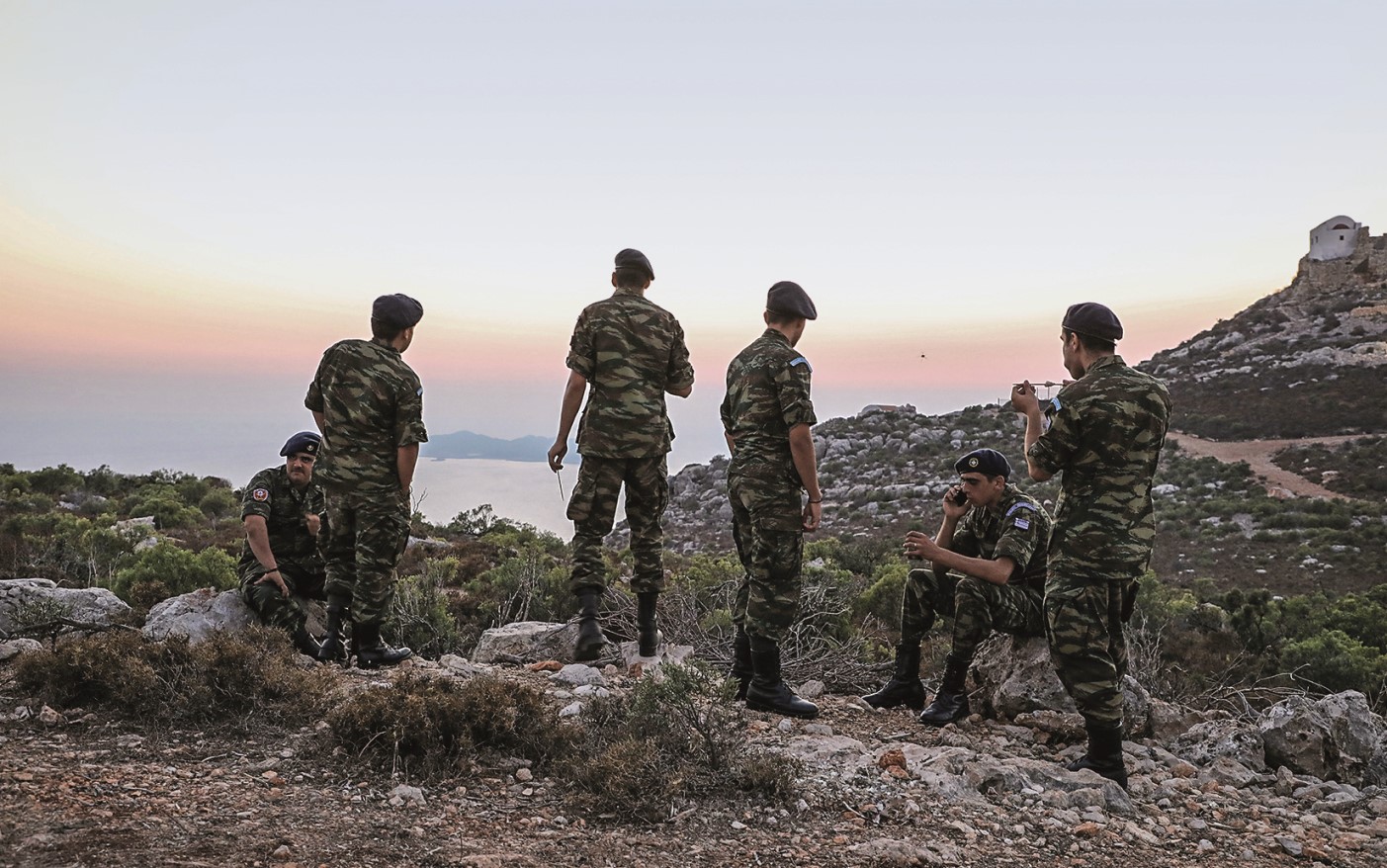
Soldiers from Irakleio, Crete are stationed at the base on Kastellorizo.
© Nikos Kokkalias
One local man who spoke on condition of anonymity summed up the situation: “Here’s the thing with Kastellorizo,” he said, as he slowly sipped a cup of Greek coffee, looking out at the Turkish coastal town of Kaş across the way. “When the television stations show the weather forecast for Greece, Kastellorizo isn’t even on the map. It doesn’t fit in the frame. ‘Big deal,’ you might say. But as soon as there’s trouble with the Turks, we magically appear on all the TV stations’ maps, this time complete with a continental shelf and an EEZ.
“What am I trying to say? That maybe the Greeks should be reminded that we are here, too, in this tiny corner, every day of the year. Yes, we’re far away, a dot, but we’re defending Thermopylae here. It’s a shame we’re only mentioned when there are problems with the neighbors, because life is tough here and the winter always brings a lot of problems – especially so this year, as we’ve had little revenue from tourism.”
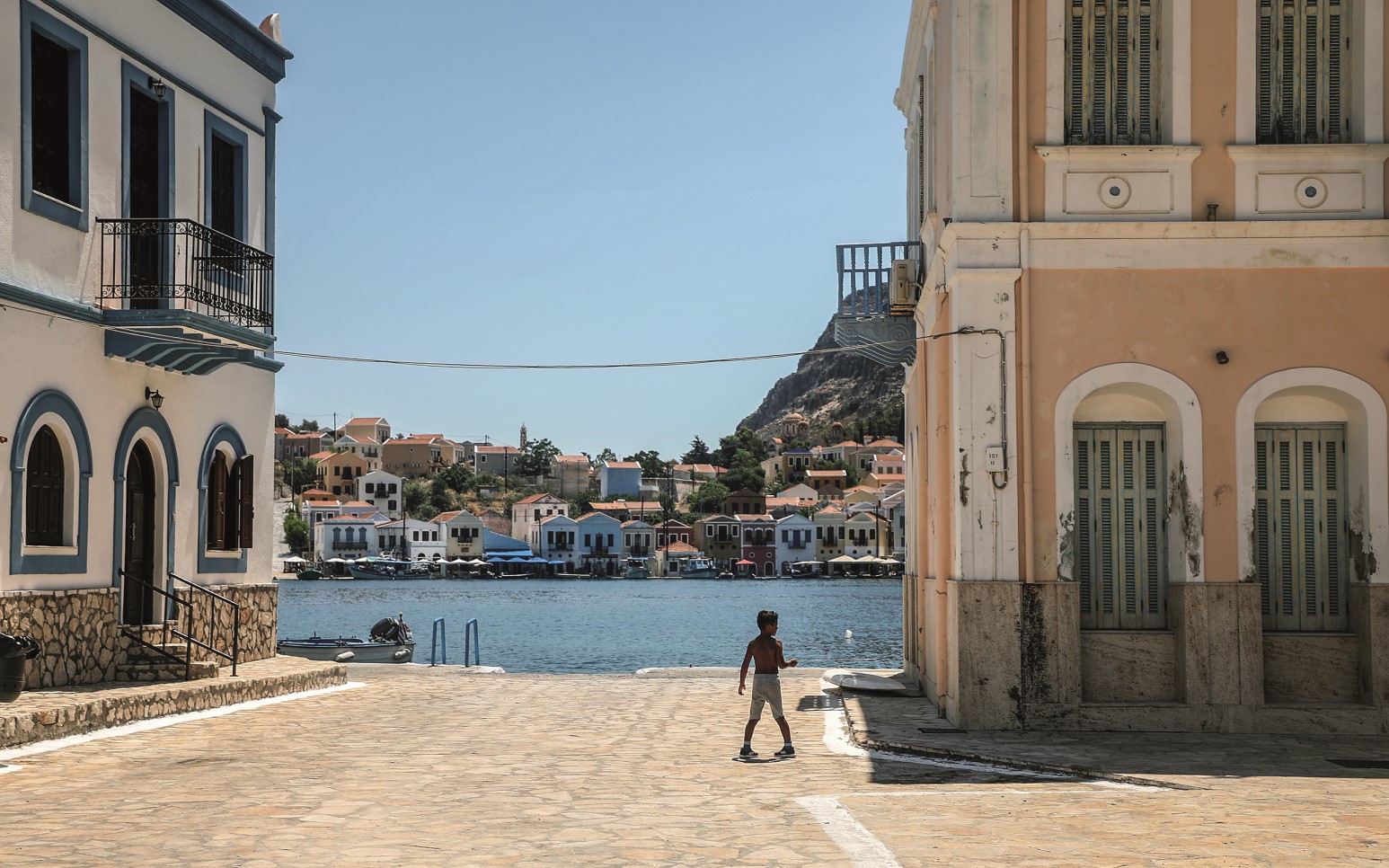
With almost no vehicles on the island, the streets are safe places for children to play.
© Nikos Kokkalias
In normal years, the money made over the tourism season is enough to sustain the locals for the rest of the year. Apart from tourism and small revenues from the military personnel posted here all year round, the islanders have no income from farming or livestock. The only activity that has brought them any real money in recent years is the sale of traditional houses, mainly to wealthy Italians who spend the entire summer here.
This year, of course, was the perfect storm: the Kastellorizians in Australia were unable to come, the pandemic stopped the arrival of day cruises from Turkey and tourists from other destinations, and concerns about tensions in the area drove off most Greeks who might otherwise have gone there this summer.
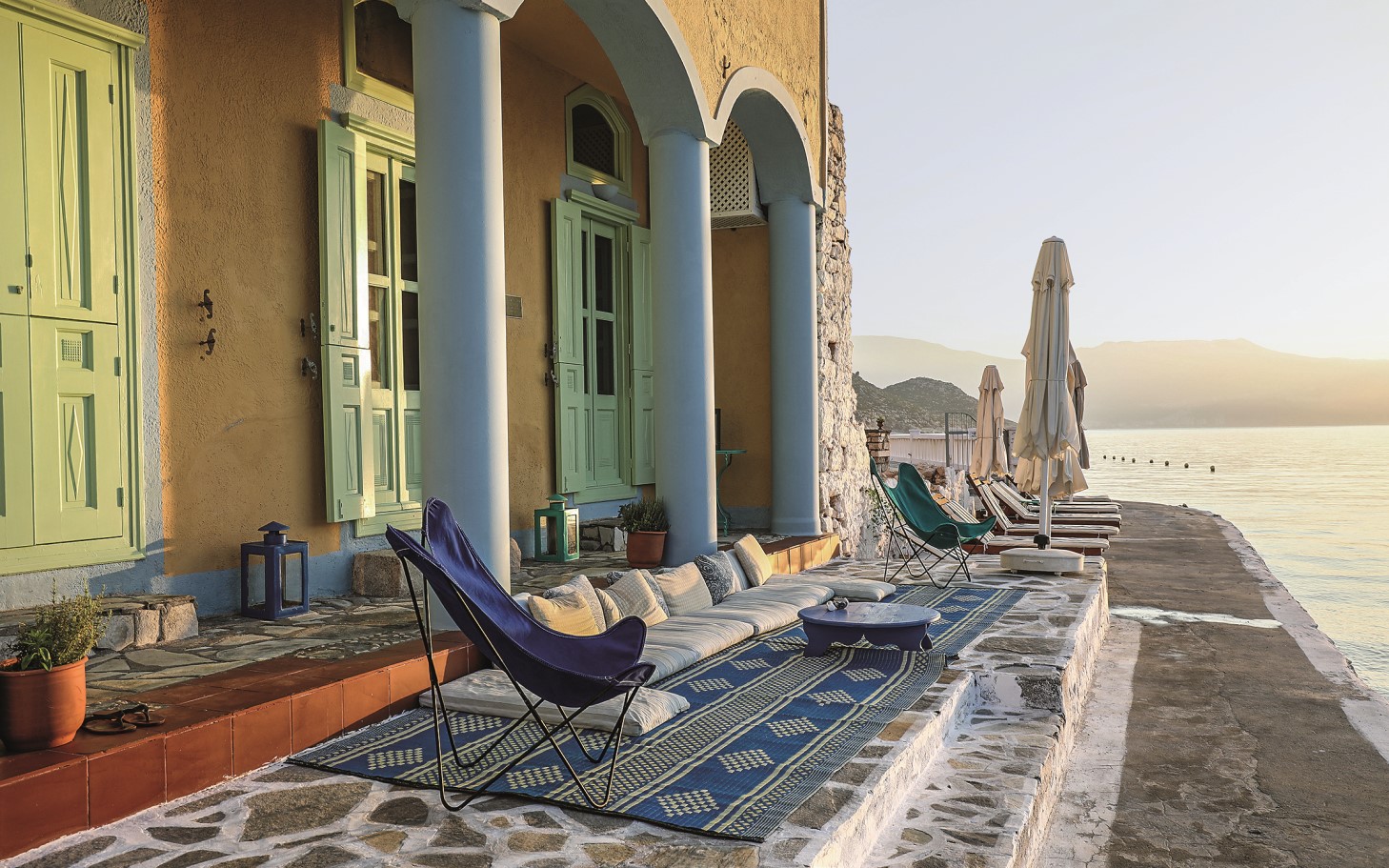
© Nikos Kokkalias
“The situation with Turkey put us in a very difficult position and is a constant source of concern. I hope a solution can be found because living like this wears you down,” Deputy Mayor Stratos Amygdalos told us. He hastened to add: “We have an excellent relationship with the residents of Kaş. We are twinned with them and traditional commercial ties stretch back through the ages. Beyond this friendship, though, there is something called the nation. In our hearts, we can make this distinction. As far as this year goes, the state must give us some support because we’re going to need it. We’re accustomed to hardship, but there’s always something missing. Right now, for example, we have quite a few specialist doctors, but we need a general practitioner. We need infrastructure and investment for the island to grow.”
The state is not entirely deaf to these demands either, as evidenced by the visit, in mid-September, of Katerina Sakellaropoulou, president of the Hellenic Republic, when she joined celebrations marking the island’s liberation from Italian occupation.
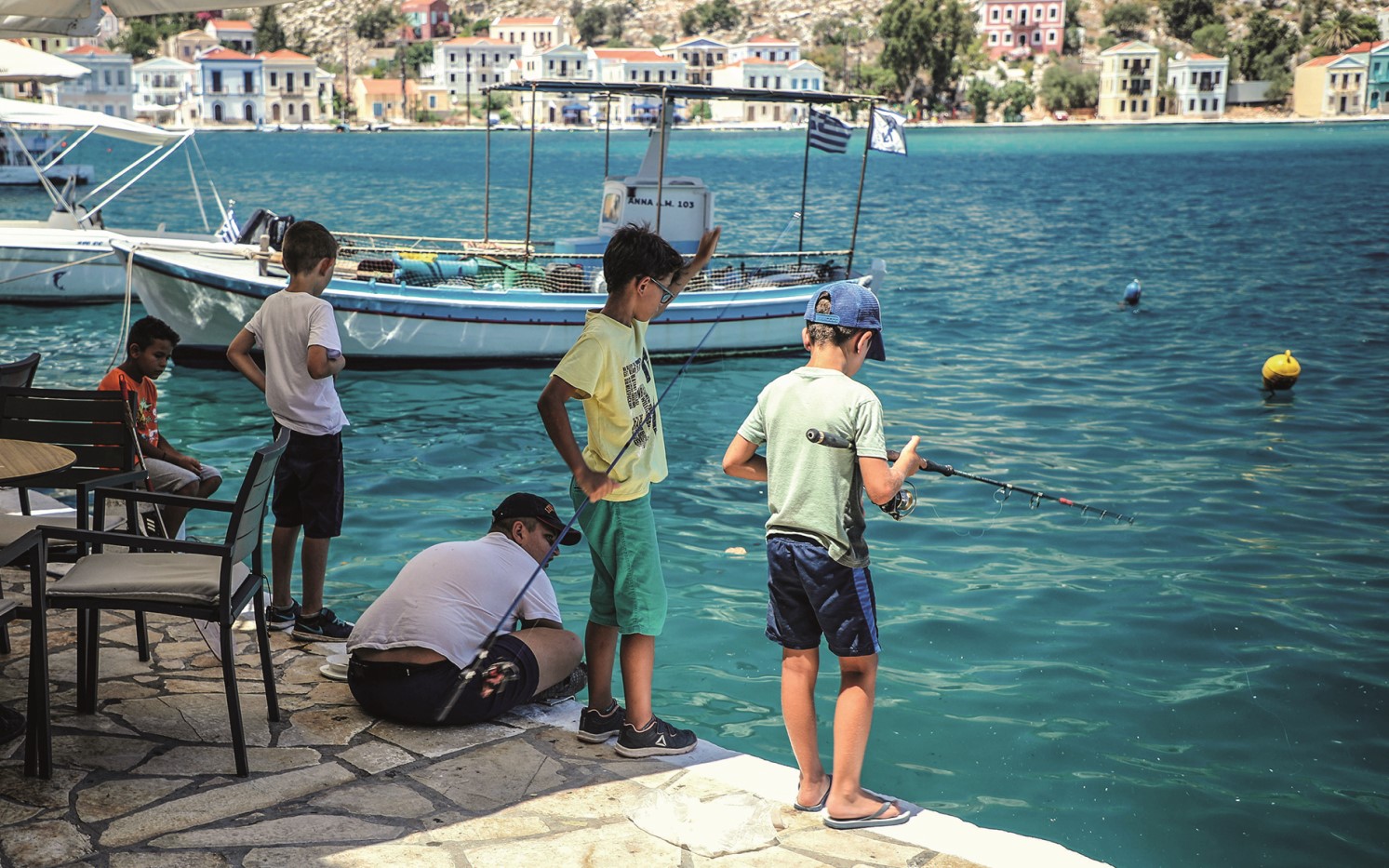
Childhood on the island can be idyllic, but educational opportunities and career choices are limited.
© Nikos Kokkalias
I asked around where we could get a good meal and was sent to the taverna Platania, best known from a scene in the award-winning WWII film “Mediterraneo,” starring Greek actress Vana Barba and directed by Italy’s Gabriele Salvatores. Photographs of the actors adorn the wall behind the till.
The public square where the taverna is located is “old Greece” in its most archetypal form: A pretty church, a stately school built with money from an overseas benefactor and the shaded taverna tables in the middle. You can add to that a plate of stuffed vine leaves scorched just so from the bottom of the pan, a cold beer soothing the throat, and the songs of legendary Greek singer Vicky Moscholiou mixing with the chirping cicadas.
Owner Katerina Magiafi was everywhere at once, apron tightly wrapped around her waist, taking care of everything. She believes that every Greek has a duty to visit Kastellorizo at least once in their lifetime, like a sacred pilgrimage. “Our compatriots should be coming here, giving us their support, not going to Mykonos, which has no need. Their presence is necessary; it makes us feel safe. Our territory is being challenged by them over there and we want to hang onto it, tooth and nail. No matter what the journalists say on television, all the tragic news, we are the rocks on this rock; we’re not going anywhere; we won’t abandon it,” she said. With evident pride, she recounted an incident from the previous March:
“It was the anniversary of the unification of the Dodecanese Islands with Greece and the military jets flew overhead for what we call their usual greeting. I ran outside as soon I heard the sound. I always have the Greek flag on my balcony and another one inside the house just in case. I looked into the sky and saw that the jets also had the Greek flag painted on their tails. ‘It’s our guys! Hurry!’ I shouted, as I grabbed the flag, unfurled it and started waving it to the pilots. The boys saw me because they were flying low. They were wild with joy. On their second pass – they always do three – they flew above me and gave a spin. The entire neighborhood was out clapping; it was crazy down here. What a beautiful moment! We all felt such pride! It gives us such joy and strength to see the jets. ‘They remembered us and came,’ I tell myself. I even have it on video on Facebook. Maria, come over and show her the video,” she called out to her daughter, who brought me her iPad.
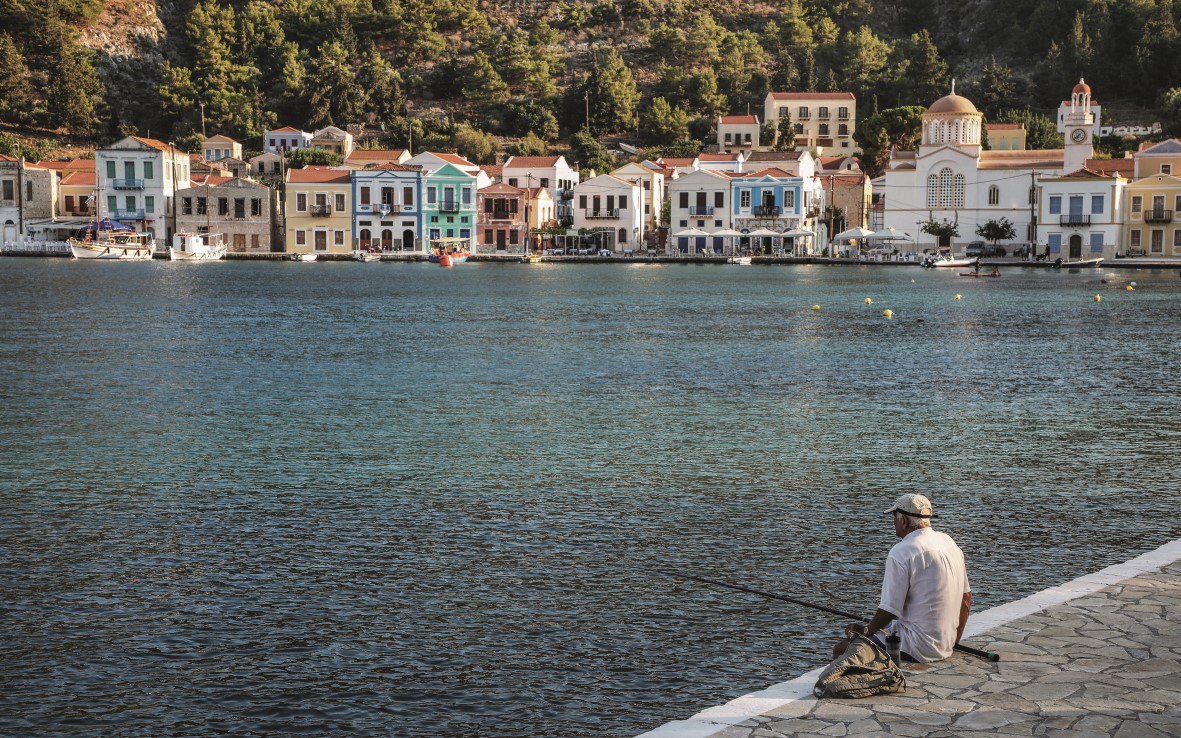
© Nikos Kokkalias
What is the relationship like with the neighbors in Kaş? “There’s no rancor or animosity. We are and always will be friends. Now, with the events of the summer, they would call us up and say: ‘Don’t be afraid. We’re with you. We love you and will support you from this end. Is there anything we can do for you?’ There’s no reason why our two peoples should not get along,” said Magiafi.
I couldn’t help myself and had to ask: Are we so alike? “No. They have their ways, we have ours. It’s the difference of religion,” she said, as she called into the kitchen to bring us a plate of delicious goat, the island specialty. “The food only comes out well if you love cooking. I wake up happy about going into the kitchen every morning,” she said, before dashing off to get back to her pots and pans.
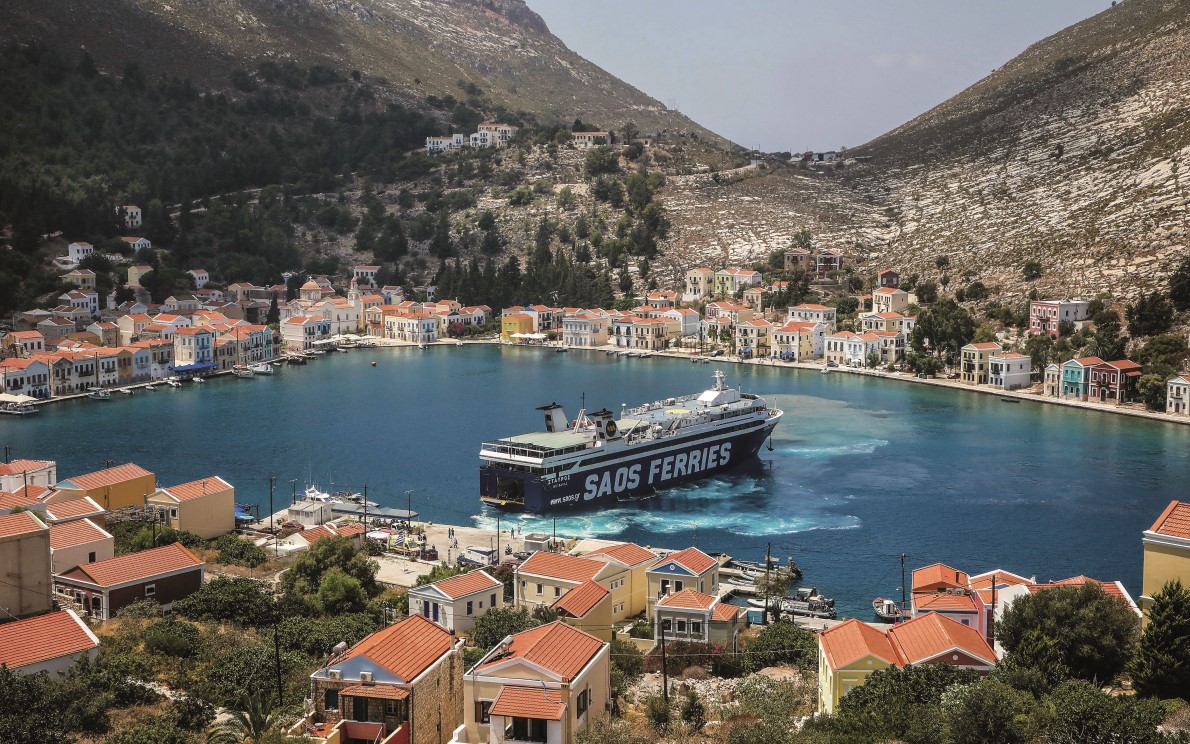
A SAOS Ferries vessel carried passengers and vehicles free of charge between Rhodes and Kastellorizo several times a week over the summer.
© Nikos Kokkalias
For centuries, Kastellorizo has had close ties with Kaş, which is just a few kilometers away and certainly much nearer than Rhodes, which is 127 kilometers away. Before the outbreak of the pandemic, the trip across was a simple thing for both Greeks and Turks, a 20-minute journey from one coast to the other. Tourists and yachts sailed back and forth all day long, and many Kastellorizians would go across to buy cheaper basic goods and vegetables. But COVID shut down the border and halted travel links, at a significant economic and psychological cost to both sides. Even though Kastellorizo has a well-equipped medical center and doctors to provide basic services, the locals have often chosen to seek treatment for more serious cases in Turkey rather than wait for a medevac from Rhodes.
Giorgos Karagiannis is one of the locals who often makes the trip across to Kaş on touring boats and knows the waters here like the back of his hand. “Our relationship with our neighbors is great. It’s politicians who make problems, not ordinary folk. We’re used to the mock dogfights and the tension, so we’re not afraid. The presence of the army makes us feel safe and ready if something were to happen, of course,” he told us as his boat headed towards the island’s famous Blue Cave.
The entrance to the cavern is so low that boat passengers need to lie down on the floor of the vessel. But it’s worth it; the darkness inside is pierced by a blue light so bright and beautiful you want to dive in to grab it.
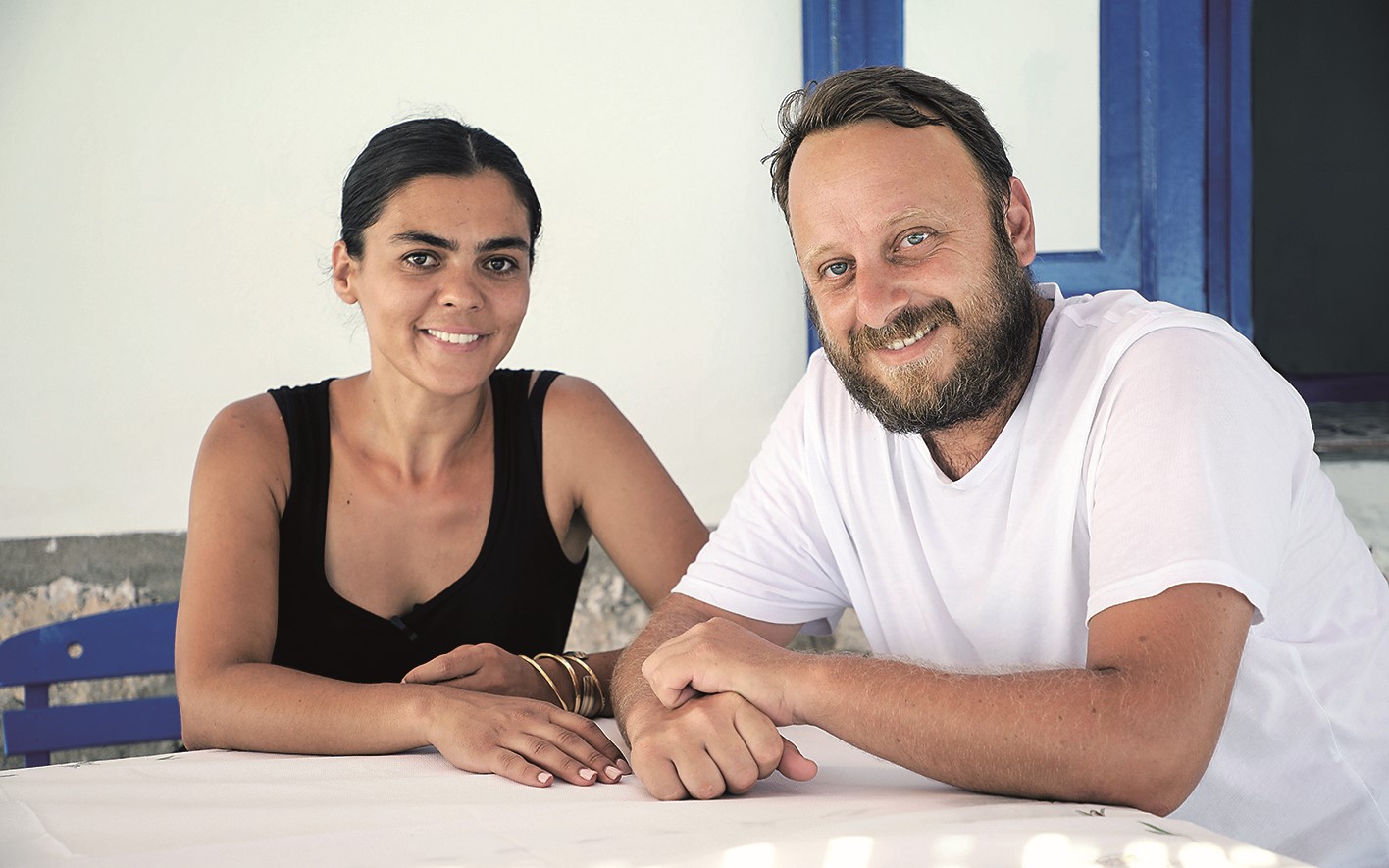
Tsikos Magiafis and his Turkish wife Hurigul run the taverna at the island’s most popular swimming spot.
© Nikos Kokkalias
The island’s sole beach with facilities can only be reached by boat as well. Located on the islet of Aghios Giorgos, it has sun loungers and a small taverna popular with the journalists visiting the island to cover the recent Greek-Turkish crisis. One reason is that the taverna’s owner, Tsikos Magiafis, has been married to Hurigul, from Kaş, since 2012.
“Our marriage has brought our people closer together,” said the 35-year-old Greek man. He met his wife on a two-day excursion to the Turkish coast. “As soon as we started going out, I went to meet her family and she came to meet mine. We decided to live here on Kastellorizo but we go across all the time so that our son can visit his grandparents,” he added.
With her family – which has distant roots on Kastellorizo – back in Turkey, Hurigul was eager for any news from us journalists of when the borders might reopen. She hadn’t seen her family since March. “The Turks love Kastellorizo as a travel destination because they have a good time, they eat well and they like the clean waters,” the young woman said. Not a single Greek television crew that came to the island to cover the recent crisis failed to ask her for an interview.
Tsikos commented on his wife’s sudden popularity with good humor: “She’s used to it now. We’ve even been in a two-page spread in the Turkish daily ‘Hurriyet’ and other foreign media. My family and the local community have never had a problem with my marriage, but I have recently been reading some really aggressive and ignorant comments by Greeks against the Turks, and it makes me very sad.”
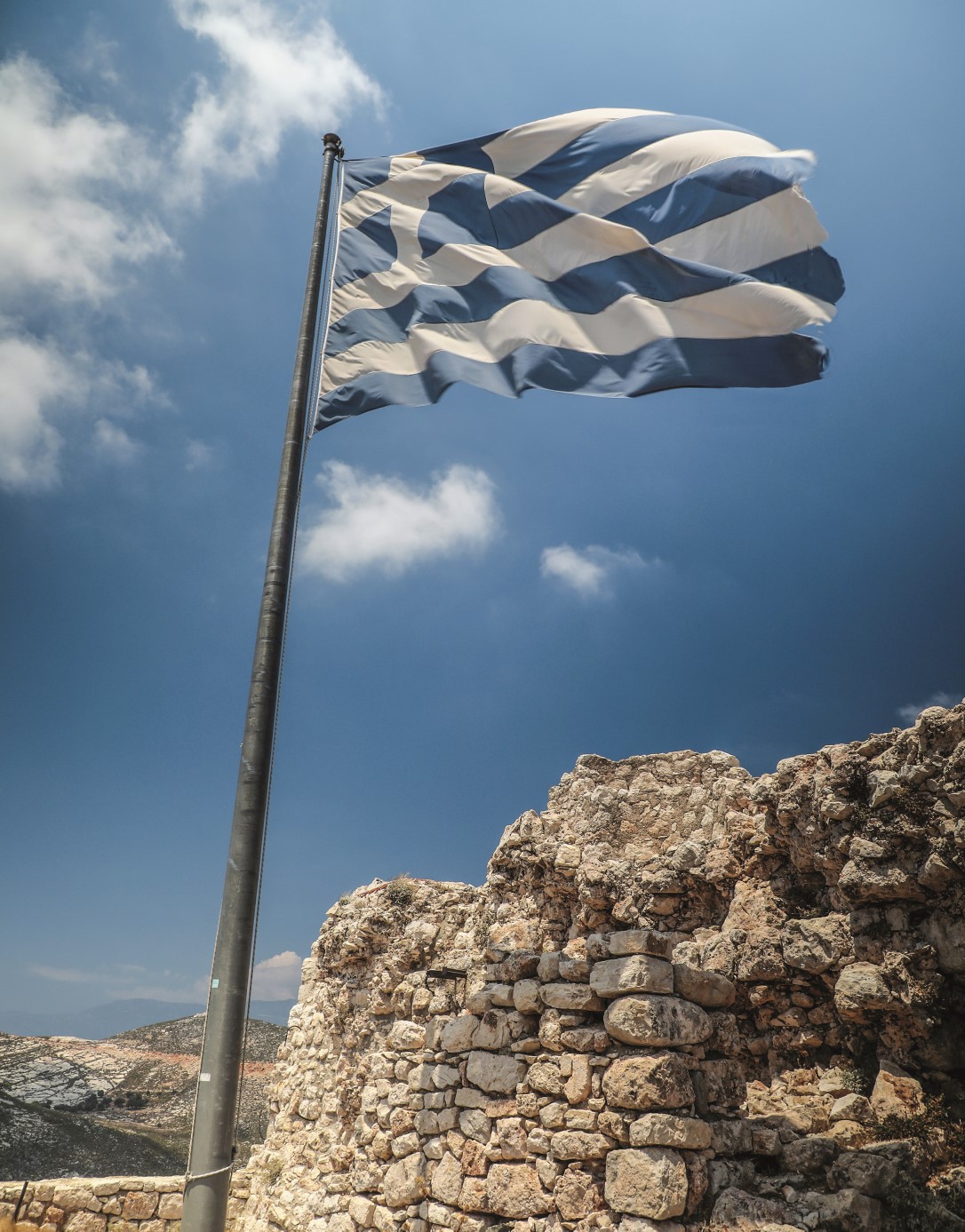
The Greek flag flies over Castello Rosso, the castle that gave the island its name.
© Nikos Kokkalias
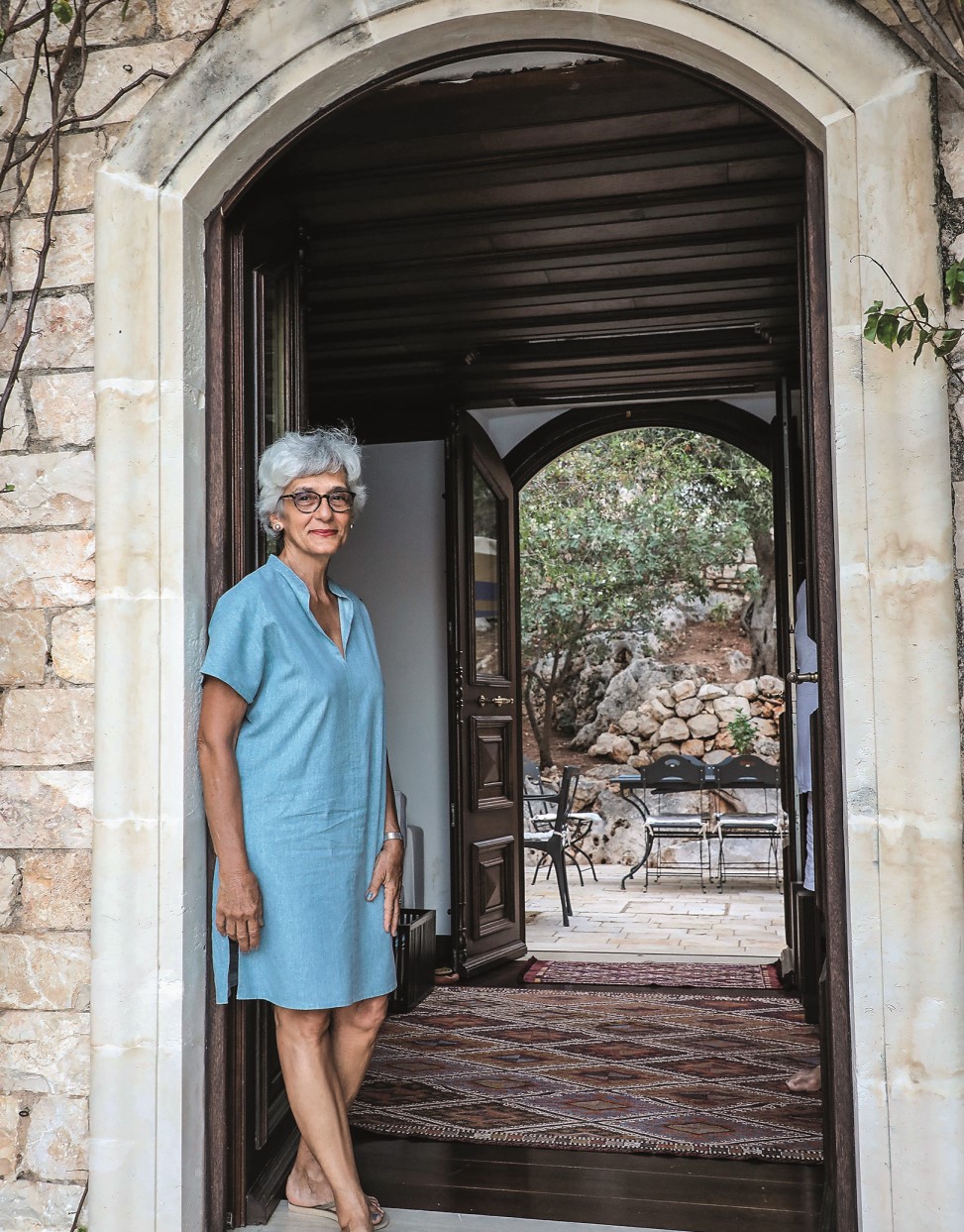
Katerina Stouraiti-Mezzedimi is a Kastellorizo native and the Honorary Consul of Greece in Djibouti.
© Nikos Kokkalias
Our last stop was to the home of Katerina Stouraiti-Mezzedimi. The Honorary Greek Consul in Djibouti hails from Kastellorizo on her grandmother’s side but has spent most of her life in Africa and is married to an Italian architect. Her Greek is inflected with that undulating accent that makes it sound so beautiful to the ear. Why should people visit the island, I asked. “It is the last, tiny piece of Greece out here in the East. But there’s another reason: anyone who visits Kastellorizo is bound to come down with the same affliction, as I like to call it. It’s the affliction of spending all day just looking at the sea and never getting tired of it. It’s like watching a film. Weeks can go by and you won’t want to do anything else.”
Her comment brought my Santorinian grandmother to mind, and I remembered her looking out at the sea and the sky with complete concentration from morning to night. I suddenly realized that this was something I’d inherited from her.
And that’s yet another marvelous thing about Kastellorizo, that it allows you to practice the wonderful Greek skill of looking at the sea and just letting life flow past.
This article first appeared in the print edition of Greece Is Kastellorizo 2020 with the title “It Happened Last Summer”.
From historic landmarks to edgy street...
At 1,160m, Metsovo blends preserved mountain...
Ten must-do experiences in Athens, from...
Patmos Aktis, Resort & Spa combines...